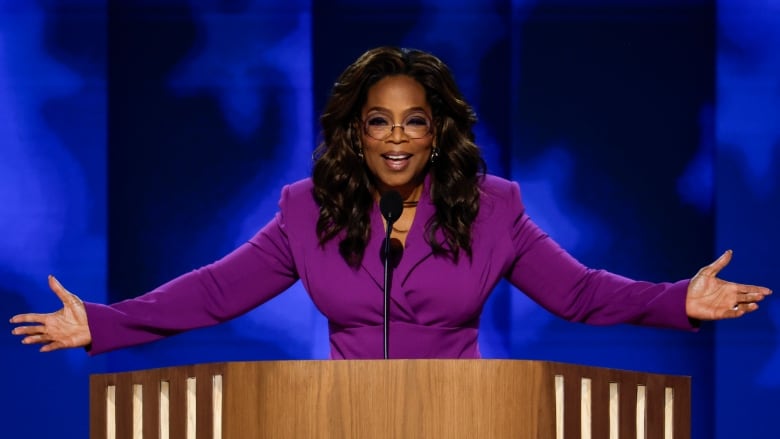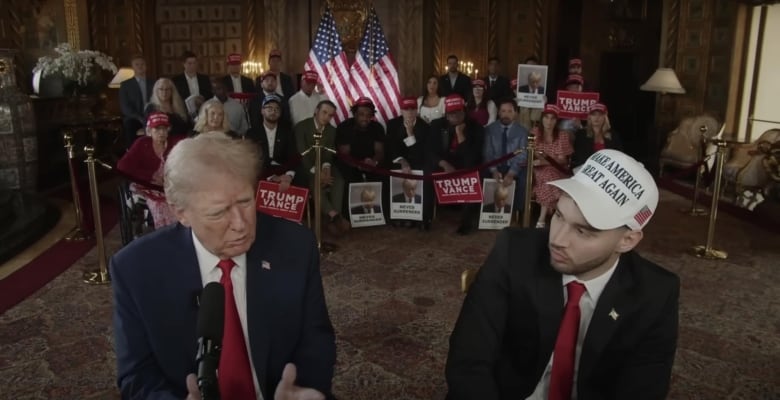Oprah or Hasan Piker? DNC tests the value of celebrities vs. influencers
Mindy Kaling, Mark Hamill, Sean Astin and more show up for Democratic convention alongside 200+ influencers

Last night, talk show icon Oprah Winfrey received roaring applause ather first-ever appearance at a national political convention.
The day before, actor Sean Astin strutted onstage to call for the first woman president in United States history, while managing to slide in references to his roles in both Stranger Things and Rudy.
And Atlanta rapperLil Jon turnedroll call into a dance party, adapting Get Low's PG-13 lyrics to celebrate the Democratic ticket of Kamala Harris and Tim Walz. Standing in front of the smiling delegates from Georgia, Lil Jonled the crowd in a chant: "VP Harristo the Walz."
Add to that appearances by people likeMindy Kaling,Mark HamillandMandy Patinkinand the last several days of the Democratic convention have been a glitzierecho of last month's Republican National Convention, which saw Kid Rock, Hulk Hogan and UFC CEO Dana White show up to bolster their preferred party.
While the star power is enough to get the DNC partyinto headlines, celebrities' ability to sway voters is much less certain.
As young people's attentions shift away from the silver screen to their phone screens, celebrity presence is still important, but more and more, it'swindow dressing something the convention's organizers seem to be aware of.
"There are some celebrities that have so much power to be able to persuade and motivate younger voters that I don't think you would say no to an endorsement from these types of A-listers," journalist Tara Palmeri told CBC. "But I think there is a fear of being mockedor being seen too much as a part of the Hollywood elite."
Political insiders speculatedthe Democratic Party would limit celebrity presence at the convention for that reason. This has sort ofcome true: despite the seemingly full marquee, the party's celebrity wrangler, Greg Propper, told The Hollywood Reporter they were being strategic about the "whirlwind" of talent asking to be involved.
Both the Democrats and the Republicans seem to have opted for a different strategy to try and sway opinion:a slate of internet-based superstars who are both more relevant to young votersand less risky to established politicians.
The art of political influence
For example, more than 200 social media influencers and content creators were given credentialed access to the DNCand got face time with some of the highest-ranking speakers there.This includes Twitch celebrityHasan Pikerinterviewing Sen.Ed Markeyin his livestreamand13-year-old Knowa De Barasoaccosting fellow political influencer Charlie Kirk in a now-viral X clip.
Chicago-based content creator Joshua Joseph saysoverall, the strategy of working with influencers has far more likelihood of enticingyoung voters.

"Even though you might not have the name recognition of, like, a George Clooney, the amount of people that you can reach through making TikToks [or] making Instagram videos has become so much bigger than at any point in the past."
It's a strategy the Democratic Party has been slow to pick up on, saysJoseph. Even some Democrats agree.
"I think that you are the future, and the rest of the world is going to realize it in 20 more years, and it will be too late," Markey said in his interview with Piker.
While celebrity has an undeniable influence on society, it's hardto translate that to politics, says Mark Harvey, author of Celebrity Influence: Politics, Persuasionand Issue-Based Advocacy. He sayscelebrities have been endorsing products since the 1920s. Butfor those endorsements to work, the celebrity's image needs to already match the brand, they must be generally trustworthy and they must have a certain credibility in that field.
At the same time, Harvey says, only a relatively small number of celebrity endorsements end up being financially successful for businesses, andthat result dips even lower when it comes to politics.
"Celebrities are persuasive, but not on all issues, right? So they aren't generally able to move people on issues where they are completely set in," said Harvey. "Somebody's not going to come around and change my opinion on abortion, change my opinion on what I have to do with guns or anything like that."
That's not to say they have no effect. Particularly influential stars can leverage their fanbase to take simple actions, like registering or committing to vote especially young people.
Given the fact only 48 per cent of Americans aged 18 to 24 voted in the 2020 U.S. presidential election, compared to 76 per cent of those aged 65 to 74, that can be appealing. But not necessarily enough to turn the tide in a tight race.
"It's like, can Taylor Swift mobilize people to vote? The answer is yes, we can actually measure that," he said. "Can Taylor Swift get enough people to vote in the state of Tennessee or Virginia or whatever to make a difference? I don't know."
Demographic advantages
Instead, Democrats and Republicans have turned to lower-riskand higher-rewardsocial media stars to appeal to young voters. This summer, Republican presidential candidate Donald Trump has appeared in a video with streaming star Adin Ross and Canadian xQcand given interviews to both YouTuber Logan Paul and podcast host Theo Von.
Trump hasutilized social media particularly Twitter to connect with voters for years, but courting young content creators has only heated up. As Trump's 18-year-old sonBarronaids the former president's social media campaign,according to the Daily Mail, his father has been able to connect even more directly with a young male audience, the New York Times reported.
There are risks to this strategy. MSNBC's Ja'han Jones wrote that Trump's social media endorsements only highlighted the lack of credible voices lending their support, whileAdin Ross was criticized by Piker for potentially violating FEC regulations when he gifted Trump a Rolex on his stream.
DaraTucker, another content creator attending the DNC, argues the balance of reach, influence and trustworthiness is different for people like her compared to traditional celebrities.
"There's a reason that I'm being included, and it doesn't really have a whole lot to do with how exciting it is to see me out in the crowd, in the same way that I was really excited at seeing Spike Lee here," she said.
"I don't think I necessarily carry that cool factor. I don't have that cachet. I think I am here to actually provide useful information to my audience and to help them be involved in the political process in a way that maybe they would not have been if I had not been here on the ground."
Whereas actors and musicians build their brands almost exclusively on their creative output and insight, content creators cultivate their audiences based largely on their opinions. That results in a built-in element of trust, alongside smaller and more focused audiences.
By offering space to those creators, Tucker said, politicians can have their cake and eat it, too: recognizable names for younger audiences who won't feel alienated or manipulated by political endorsements.
"People come to rely on the content that we put out there. They come to rely on our opinions, our perspective, our point of view, our voices," she said. "So for the Democratic National Convention, for the Republican National Convention, to be utilizing creators like me, I think is a really, really smart move."
With files from Griffin Jaeger and Makda Ghebreslassie














_(720p).jpg)


 OFFICIAL HD MUSIC VIDEO.jpg)
.jpg)



























































































